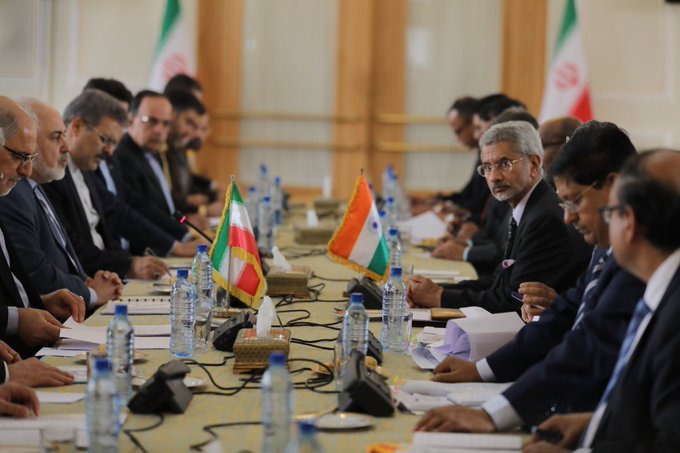The Union Minister of External Affairs, Subramaniam Jaishankar met Iranian minister of Roads and Urban development Mehrdad Bazrpash and foreign minister Hossen Amir-Abdollahian during his visit to Iran this week where they discussed establishing a long-term cooperation framework with respect to Chabahar Port.
Bazrpash said a working committee will enable the activation of transit capabilities and the use of the International North South Transport Corridor and both nations as per Iranian media report proposed forming a joint transport committee to expand cooperation framework between the two countries.
Both ministers also discussed India ‘s involvement in the development and operation of the Chabahar Port. Hossein Amir Abdollahian pointed that both nations have been working together on this project for two decades now. “I emphasized India ‘s commitment to the project and discussed how we can establish a firm, sustainable roadmap for India’s continuous involvement over the coming years. Given the importance of this project for both nations, I emphasized the need to monitor its progress under the direct supervision of the political leadership,” he said.
Regional Connectivity
The External Affairs Minister (EAM) during his meeting with his Iranian counterpart, said that regional connectivity is a critical pillar of India-Iran relations. The connectivity related matters were prominent in the agenda during Jaishankar’s discussions with Hossen’s Amir Abdollahian. “I reiterated India’s interests in benefitting from Iran’s geographical position to access markets in Central Asia, Afghanistan, and Eurasia. We discussed the prospects of energizing the International North South Transport Corridor (INSTC), Jaishankar said.
About INSTC
The International North South Transport Corridor (INSTC) envisions a freight corridor through a comprehensive network of shipping, rail and road routes connecting South Asia to the Middle East (West Asia) and Europe. The 7200 km long corridor will encompass India, Iran, Azerbaijan, Central Asia, Russia and Europe. Two dry runs were conducted to test the feasibility of the corridor in 2014. The first route connected Mumbai, India to Baku, the capital of Azerbaijan vis Bandar Abbas while the second linked Mumbai to Astrakhan via Bandar Abbas, Tehran and Bandar Anzali.
Importance of Chabahar Port
The Chabahar Port is located in southeastern Iran along the Gulf of Oman and has both strategic and commercial interests overlooking the maritime gateway providing access to Central Asia and Europe. India wants to develop the Chabahar Port because it aims to bypass Pakistan as the route provides a more secure a direct route for Indian goods to get to Afghanistan. India has mostly sent its shipments and aid to the Afghan People which included 50,000 tonnes of wheat consignment via this port. Previously, this task was done by transporting trucks via the Wagah Attari Border crossing.
Jaishankar also met Ebrahim Raisi, where he highlighted India’s interests in signing concluding a comprehensive and long-term agreement on the development of Chabahar Port. The Union Minister stressed India’s commitment to the Chabahar Port and discussed the need for a firm, sustainable long-term roadmap for India’s continued involvement.
While announcing the country’s interests in concluding a comprehensive and long-term cooperation agreement with the Islamic Republic of Iran, the Minister of Foreign Affairs of India have emphasized India’s complete adherence to its commitment in the Chabahar Port development project as well as the comprehensive development of cooperation with Iran, the Iranian President office said in a release.
Both the INSTC and Chabahar port hold immense strategic for India. They are key components of New Delhi foreign policy and economic outreach as these projects will help contribute to economic growth by facilitating smoother trade flows. India and Iran agreed that India would run the Shahid Beheshti Port terminal for ten years in 2016. The finalization of the long-term deal got delayed because of disagreement on where to solve the disputes, if they arrive in near future.




















Comments